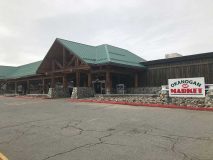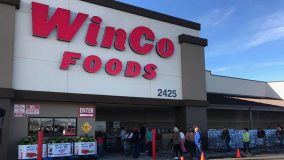by Lorrie Griffith/editor-West
One of the dichotomies in a state like Washington is that while there are major metropolitan areas like Seattle, there also are extremely rural areas.
But, of course, both are subject to the same state laws, like the $12 an hour minimum wage that went into effect this year that will go to $13.50 an hour in January 2020, and the Paid Family & Medical Leave act that also will go into effect in January 2020. (Premium assessments begin Jan. 1, 2019, in preparation for the law to go into effect a year later.)
Jan Gee, president and CEO of the Washington Food Industry Association in Olympia, said the minimum wage issue is one of those that legislators, even from the rural areas, are hesitant to be too vocal about because the general public doesn’t have a real grasp of the economic implications of raising the minimum wage, even in a state with such diverse economic areas. They see the extremely high cost of living in Seattle and think $12 an hour is not that much.
“It is definitely a PR challenge to get legislators to be outspoken on it to help the public understand,” Gee said.
In recent months, the state has lost a dozen or more grocery stores in rural areas, according to Gee.
“We’ve lost some smaller stores out in the pretty isolated areas where they couldn’t find a buyer,” she said. “When you have a minimum wage of $12 and you apply that across the board, what it means to PCC (Community Markets) or New Seasons (Market) up there in metropolitan Seattle is very different than what it does to a rural store in eastern Washington.”
Residents in these newly created food deserts have to travel to larger cities to get their provisions, often buying in bulk at stores like Costco (which is based in Washington, in Issaquah). Walmart has some stores in the more densely populated areas of the state, Gee noted, and WinCo has 22 stores in the state. Independents like Rosauers, Yoke’s and Harvest Foods also serve a number of communities.
Gee said she has been in contact with The Food Trust, an organization that was founded in 1992 to “ensure that everyone has access to affordable, nutritious food and information to make healthy decisions.” She has offered WFIA’s assistance to the organization in hopes that it will “come into the state and we’ll be able to do a little work with them in some of these food deserts.”
Grocers, both large and small, also are expected to feel a strong impact from Paid Family & Medical Leave going into effect.
Gee said the Washington version of the legislation—it will be the fifth state in the U.S. to offer paid family and medical leave benefits to workers—is “the most progressive in the nation.”
The leave will be funded by a payroll tax that is split between the employer and the employee, and for employees who make less than $15 an hour (many in the grocery industry), they will qualify to draw 90 percent of their compensation for 16 weeks every 52 weeks worked for “birth, bonding, a serious family serious illness or your own serious illness,” Gee said. “We expect to see some pretty high absenteeism when the benefits kick in.
“The challenges just continue in this very liberal state. What affects our retail stores vs. what affects Amazon and Boeing—huge companies in our state—is so different, but we get one-size-fits-all.”
Stepping into the gap

(Facebook photo)
There is some good news on the food desert issue.
One independent grocery operator, Phil Blackburn, has opened IGA Okanogan Market in Okanogan in an area that had a long supermarket drought.
That area, Gee noted, hadn’t had a grocery store in 12 years.
“The area has a high-low income population, so there were a lot of SNAP customers that needed the food,” she said, lauding Blackburn’s efforts.
Blackburn was in Washington, D.C., with Gee during the store’s first few weeks of operation, “and he was getting great sales reports,” she said. “The community was really embracing having a grocery store.”
Rosauers, a banner of member-owned grocery cooperative URM Stores in Spokane, also is planning a store in a town that lacked a full-service grocer. A Rosauers will open in spring 2019 in Ridgefield, according to the Columbian. It will be the anchor store for the Port of Ridgefield’s Discovery Ridge property. The ground-up store will be 53,000 s.f.; a Rosauers-operated gas station also is in the works, according to the paper.
Ridgefield City Councilor Don Stose told the Columbian, “What the citizens of Ridgefield are looking for is a grocery store.”
Gee noted that especially in more rural areas, grocery stores “are kind of the heart of the community. We have story after story where we’ve had massive fires and the grocery stores are the ones who provide the food and water and everything for the first responders and the bulletin boards to help families to reconnect and stuff. Having a grocery store is really important to a community.”
Amazon Go and more
The first Amazon Go store opened to the public in January in Seattle after being tested by Amazon employees for several months.
Gee said many WFIA member grocers have been visiting the store and buying items to see how it all works. She has not been to the store yet, but when she and her staff travel to Seattle for the WFIA Industry Awards Dinner on May 24, they are building a day into their travel schedule to allow a trip to the store. Shoppers scan an app on their phones when they enter the store, do their shopping and walk out when they’re done. The app automatically will charge their Amazon account and send them a receipt.
Speaking of technology and grocery shopping, Gee said online shopping and delivery have taken root across the state, not just in Seattle. Independents and chains alike “know they have to do this.”
She also noted that Supervalu’s acquisition of Unified in June 2017 “created some challenges in the supply chain for the state’s retailers, which is understandable when you take the largest distributor in our state and roll it into the smallest distributor in our state. Now, they’ve got all the staff integrated in the Tacoma facility, so it’s starting to smooth out.”
URM Stores President and CEO Ray Sprinkle told The Shelby Report last fall that his company stood ready to offer an alternative supply option to grocers formerly supplied by Unified.
“We want to make sure they understand there are options out there. We believe we have a viable business model to entice them.”
Also on the supply side, KeHE Distributors opened a warehouse in Portland that gave the company potential entrée into the Washington market.
“Their whole purpose in opening in Portland is to expand their markets up here, and they are being pretty aggressive,” Gee noted. “Competition makes for a very healthy marketplace.”
Indeed, there is no shortage of stores in Washington that have either recently opened or will open soon.
• New Seasons Market will open a store in Seattle’s Ballard neighborhood on May 9, marking the Portland, Oregon-based retailer’s second store in the Seattle area. (The Mercer Island store opened in November 2016.)
The 25,000-s.f. store marks the release of New Seasons’ meal kits. The recipes for the pre-packaged meals were developed for New Seasons by Chef and double-Michelin-star-holder Matt Lightner. The meals can be prepared in 20-30 minutes and be served as vegetarian side dishes or heartier entrees with the addition of extra protein.
• Sprouts Farmers Market will open its first store in Washington State in the third quarter of this year; it is located in Mill Creek, at 13314 Bothell-Everett Highway.
Sprouts Chief Development Officer Ted Frumkin said April 4, “As we continue to enter new markets, we’re pleased with the customer response to Sprouts’ unique combination of health and value. We’re looking forward to bringing healthy living for less to new neighbors in Philadelphia and the Mill Creek area of Seattle later this year.”
Sprouts says it offers “fresh, natural and organic products at affordable prices.” Stores sell fresh produce, meat and seafood from The Butcher Shop and Fish Market, freshly prepared entrees and sides at the Market Corner Deli, bulk foods, vitamins and supplements, dairy, bakery, natural body care items and more. In addition to thousands of natural, organic and gluten-free groceries, shoppers can find more than 2,400 Sprouts brand items, which meet strict ingredient standards.
• Walmart announced a sweeping store remodel plan in April that includes updates for its Supercenters in Bonney Lake, Lakewood, Spanaway and Tumwater, as well as remodels in Covington, Ephrata, Everett, Kennewick, Oak Harbor, Pasco, Port Angeles, Richland, Spokane, Wenatchee and two stores in Vancouver, according to the News Tribune.
The paper said, “The work is part of an estimated $56 million Walmart is spending in the state to upgrade 16 stores and roll out in-store and online innovations, including its new pickup towers.”
The retailer’s online grocery pickup and Scan & Go technology also will continue to roll out in area stores, the News Tribune said, adding that Walmart now offers grocery pickup at 15 Washington locations and plans to roll out the option to about 15 more area stores in the coming year.
• Seattle-based PCC Community Markets will open its first store south of Seattle, in Burien, on May 23. The grocery co-op will open the 25,000-s.f. store in the Five Corners Shopping Center on 1st Avenue South will be the area’s first certified organic grocery and PCC’s first location that is slated to operate on 100 percent renewable energy.
The new store also will offer PCC’s new meal kits. Each kit, hand-packed in a PCC kitchen, includes organic produce and non-GMO locally raised meats; the packaging is compostable and recyclable.
• WinCo Foods opened a new store in Washington State in April, in the Union Gap area of Yakima.

Photo: KIMAtv.com
The store, on Longfibre Road, drew hundreds of Yakima Valley shoppers, according to the Yakima Herald. Lines were long by 7:45 a.m., which led the retailer to open the store 45 minutes early, the paper said.
“I’ve been to a lot of store openings, and I don’t think I’ve seen a town so excited as Union Gap and Yakima seem to be,” WinCo Foods spokesman Noah Fleisher told the paper, which added that Boise, Idaho-based WinCo has tried to open a store in the Yakima Valley several times over the course of two decades. The Longfibre Road tract was purchased by WinCo in 2010, but the Great Recession kept construction from starting until the fall of 2016, the paper said.
Keep reading:
https://www.theshelbyreport.com/2018/06/04/pcc-plans-bellevue-wash-store/
https://www.theshelbyreport.com/2018/05/18/sprouts-first-washington-store-opening-date/
https://www.theshelbyreport.com/2018/06/04/safeway-teamsters-strike-possibility/

